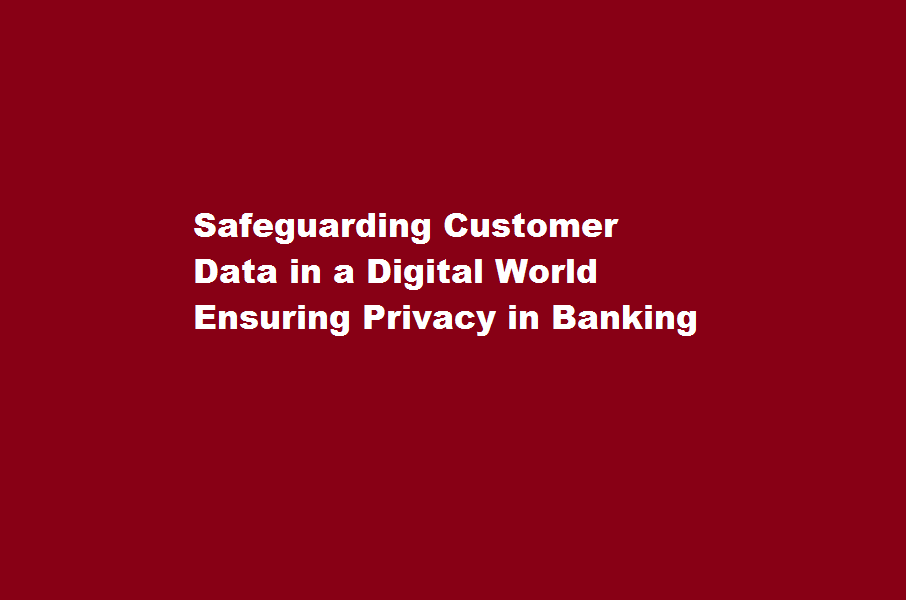Safeguarding Customer Data in a Digital World Ensuring Privacy in Banking
3 min read
In today’s increasingly digital world, banks face the critical task of safeguarding customer data and ensuring privacy. With the proliferation of online and mobile banking, the protection of sensitive customer information is of paramount importance. This article delves into the strategies and measures employed by banks to ensure the protection of customer data and privacy. It highlights the significance of robust cybersecurity practices, adherence to privacy regulations, and customer education in maintaining trust and security in the banking sector.
Robust Cybersecurity Measures
Banks invest heavily in robust cybersecurity measures to protect customer data from unauthorized access and breaches. This includes implementing advanced encryption technologies, multi-factor authentication, intrusion detection systems, and regular security audits. By continuously monitoring and updating their security infrastructure, banks can mitigate the risk of cyber threats and safeguard customer data.
Compliance with Privacy Regulations
Banks adhere to stringent privacy regulations, such as the General Data Protection Regulation (GDPR) and the California Consumer Privacy Act (CCPA). These regulations outline guidelines for the collection, storage, processing, and sharing of customer data. Banks ensure compliance by implementing privacy policies, obtaining explicit consent from customers, and providing transparency about data usage and protection practices.
Data Encryption and Tokenization
To enhance data security, banks employ data encryption and tokenization techniques. Encryption ensures that customer data is transformed into an unreadable format, making it inaccessible to unauthorized individuals. Tokenization replaces sensitive customer data with unique identifiers or tokens, reducing the risk associated with storing and transmitting sensitive information.
Regular Security Audits and Testing
Banks conduct regular security audits and penetration testing to identify vulnerabilities in their systems and networks. These assessments help banks proactively address security weaknesses and strengthen their defenses against potential threats. By engaging third-party security experts, banks gain valuable insights into potential vulnerabilities and can implement necessary measures to enhance security.
Customer Education and Awareness
Banks play a crucial role in educating customers about the importance of data privacy and security. They provide guidance on creating strong passwords, recognizing phishing attempts, and maintaining secure online practices. By promoting customer awareness and offering resources such as security guides and workshops, banks empower customers to protect their own data and contribute to a secure banking environment.
Employee Training and Awareness
Banks ensure that employees receive comprehensive training on data privacy and security protocols. By fostering a culture of security awareness, banks educate employees about the latest cyber threats, phishing techniques, and best practices for handling customer data. Regular training programs and internal communication channels help employees stay updated and vigilant in protecting customer information.
Conclusion In an increasingly digital world, banks must prioritize the protection of customer data and privacy. By implementing robust cybersecurity measures, complying with privacy regulations, utilizing data encryption and tokenization, conducting regular security audits, and promoting customer and employee education, banks can create a secure banking environment. Maintaining trust and security is vital for customer confidence and the long-term success of the banking sector in the digital era.
Frequently Asked Questions (FAQs)
How do banks protect customer data from cyber threats?
Banks employ robust cybersecurity measures, including encryption technologies, multi-factor authentication, intrusion detection systems, and regular security audits, to protect customer data from cyber threats.
What privacy regulations do banks need to comply with?
Banks need to comply with privacy regulations such as the General Data Protection Regulation (GDPR) and the California Consumer Privacy Act (CCPA), which outline guidelines for the collection, storage, processing, and sharing of customer data.
How do banks educate customers about data privacy and security?
Banks educate customers through various means, including providing guidance on creating strong passwords, recognizing phishing attempts, and maintaining secure online practices. They offer resources such as security guides, workshops, and regular communications to promote customer awareness.
Read Also : Demystifying International Money Transfers Understanding The Process in the Banking Sector






